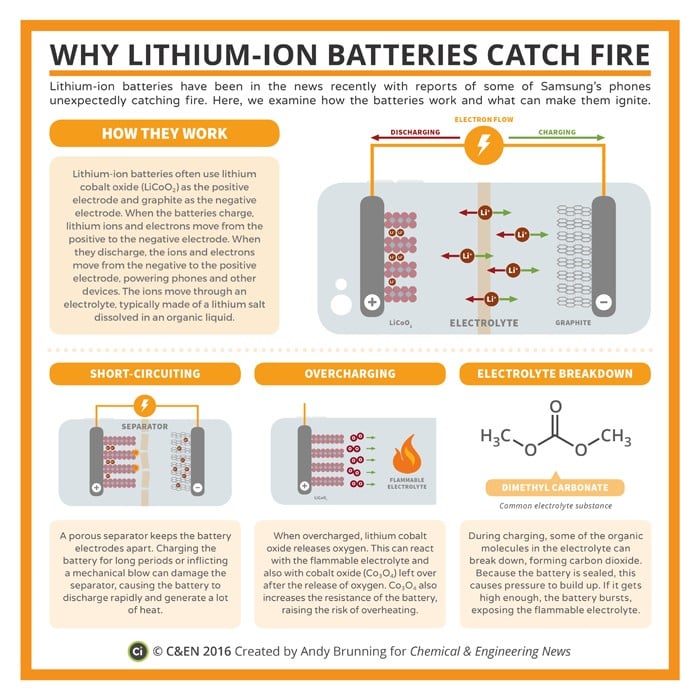A fire at a Samsung factory north
of Tianjin in China, combined with the release of the official report on
the Note 7, puts the spotlight back on battery safety, for better or
worse.
The fire originated from the plant’s waste facility and was caused by discarded, defective lithium-ion batteries which were stored with other electronic waste material. While the fire, itself, caused no major disruption to the factory's output, the events of 2016 are still fresh in the minds of consumers and Samsun certainly does not need this news while rebuilding trust in their products—especially their products using their lithium-ion batteries.
Samsung Recall of the Note 7: Results and Aftermath
Samsung received massive backlash in late 2016 when the company had to recall Samsung Galaxy Note 7 cell phones when it became clear that a design flaw was causing some of the phones to catch fire. Subsequently, the phones were banned on airplanes and the company’s investigation revealed that the lack of space in the battery compartment to allow the safe expansion of batteries and dissipation of heat during charging was the cause of the cell phones catching fire. This proved to be an expensive oversight, costing the company $5.3 billion and a hefty part of their reputation.The Samsung investigation, which affected approximately 2.5 million units, resulted in a transparent report outlining the likely cause of the defects. Typically, companies remain fairly silent on the specific details that cause products to be defective. Many choose to release vague statements such as "a battery defect is causing overheating and an increased chance of fire”.

A screengrab from Sony's infographic report. Image courtesy of Samsung
By sharing the details of the investigation, hopefully consumers can better understand how the company can overcome battery problems in future products. Samsung is now implementing an “8-Point Battery Check” which involves rigorously testing batteries, and careful review for potential flaws before sending them to market.
Lithium-Ion Batteries: Fickle and Difficult to Dispose of
Lithium-ion batteries are known to be fickle in regards to a variety of factors, including charging/discharging rates, temperature, and manufacturing defects. Samsung is not the only company to experience strife over battery problems.Hewlett-Packard recently extended a recall on lithium-ion laptop batteries due to increased risk of overheating and catching fire (affecting roughly 140,000 units in total) and Toshiba also issued a recall on laptop batteries for similar reasons (affecting roughly 100,000 units in total).

Infographic courtesy of Chemical & Engineering News.
There is plenty of talk on how to eventually replace lithium-ion batteries in consumer products, but until a better alternative comes along, they remain the standard.
Despite the batteries' sensitivity to factors that can cause them to catch fire and despite that they contain materials that can be harmful to the environment (both during the lithium mining process and after the batteries are thrown away), there are not really strict regulations in how they're are disposed of in either a commercial or consumer setting, and rules tend to vary by jurisdiction.
Consumers are encouraged to turn their batteries into recycling or safe disposal programs, but such programs are not necessarily widely available. Recycling batteries is also generally quite costly to do. In commercial settings, batteries are discharged and then shipped for incineration.
There is not much information available regarding how the batteries were disposed of at the Samsung SDI factory, but batteries can certainly create a closed circuit and heat up if they are in contact with one another or with other conductive material. Even if other causes emerge for the fire's origin, neither lithium-ion batteries nor Samsung are gaining much consumer trust these days.







No comments:
Post a Comment